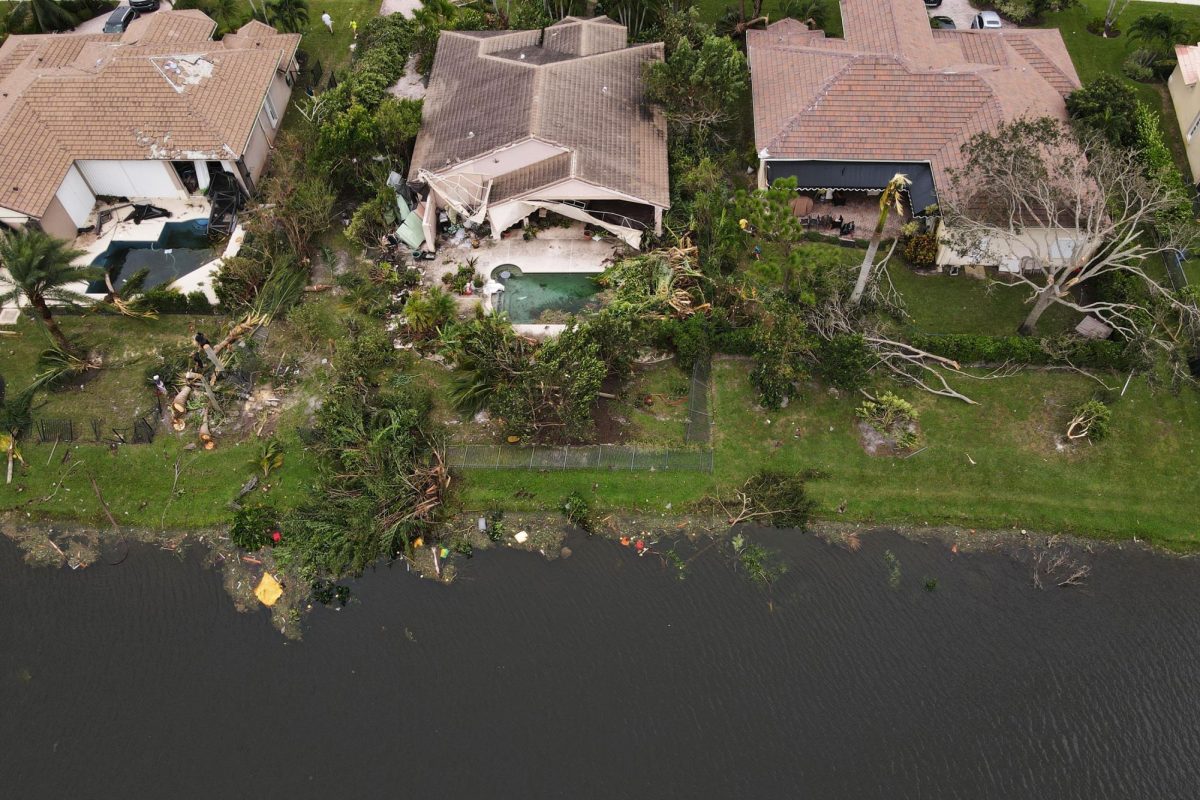Updated: Oct. 21, 2024, at 4:55 p.m.
Junior John Parel said he was studying in his residence hall room when he received a call from his parents in Wellington, Florida — a village near West Palm Beach in the southern part of the state — about a tornado that had occurred in their town a few hours before Hurricane Milton made landfall.
Hurricane Milton made landfall on Oct. 9 in Siesta Key, a beach town in the west central coast of Florida, as a Category 3 storm after downgrading from a Category 5 as it moved into the state just two weeks after Hurricane Helene. Milton’s high winds scattered debris along its path toward the Atlantic Ocean, toppling houses on stilts and ripping roofs off homes, generating tornados and killing more than 24 people as of Saturday.
“My parents told me, ‘Oh yeah we’re in the middle of a tornado,’” Parel said.
Parel said his hometown was not in the hurricane’s direct path, but it was hit by a sudden tornado a few hours before that caused large trash cans to collide with the roofs of houses and cars to crash into garages.
At least 41 tornadoes sparked by Hurricane Milton ripped through Florida during the storm’s landfall, causing at least five confirmed deaths. Hurricanes have been known to produce tornadoes due to the heat and humidity present in these storms, and their volatile wind speed and direction. The cost of the damages from Milton could be as high as $34 billion, according to a research firm.
Parel said residents of Wellington were not expecting a tornado and received a text message warning about 30 minutes before the twister hit the town.
“In a lot of the areas where you didn’t have to evacuate, people didn’t have shutters up or anything, but there was still a tornado,” Parel said. “So the tornado actually is what caused more of the damage than the hurricane itself.”
He said the hurricane’s strength dropping from Category 5 to Category 3 caused Florida residents to not take as many precautions. He said in the wake of Milton’s destruction, people with homes that didn’t experience severe damage should temporarily “adopt” families while their houses are being repaired, allowing them to sleep over and share meals with them during their time of need.
“Overall, it’s a big community effort just to help out one another, because you never know when you’re going to be in that position one day,” Parel said.
Sophomore Raquel Korff said she was scrolling through TikTok a few days before Milton hit when she saw several clips of a meteorologist urging Florida residents to evacuate certain areas, which made her realize how serious the storm was. Korff, who is from the southern part of the state in Palm Beach County, said her town was not in Milton’s direct path, but it was lightly hit by a tornado after the initial storm came through, which toppled trees and left debris on roads in Wellington.
“It kind of hit me that ‘Wow, this is pretty intense,’” Korff said.
Korff said she felt “helpless” but also in awe of how “insane” nature can be. She added that she thought the tornado was a joke at first because they aren’t common in Florida until her father and friends in Wellington confirmed it was real.
Korff said residents in the evacuation zones primarily for the coastal areas of the state were given “sufficient warning” based on the warnings authorities gave residents that she saw on social media. She said she felt worried and sympathized with those who had to drop everything and evacuate.
“I guess sometimes that’s what people need to hear because it’s kind of known that we Floridians are pretty stubborn until it comes into hurricanes,” Korff said.
Korff said there should be more government-sponsored or affordable options to evacuate, as people only receive disaster assistance from FEMA if their application is approved. Korff said many residents in her area, particularly those who weren’t affected, had family or friends who were forced to evacuate, which can cause emotional distress for everyone involved because it’s a “scary thing” to hear happen to a loved one.
“I think right now, it’s about showing support, spending time with those family members, remembering that each day is precious and becoming more and more prepared each and every time,” Korff said.
Junior Lily Vanderlaan said her hometown of Fort Myers was still recovering from Hurricane Ian, a Category 4 storm that struck the state in 2022, as the rebuilding process for business and housing in the area is still ongoing. She said she was anxious when she heard the news from a friend a week before Hurricane Milton made landfall because she worried it would delay the city’s recovery.
“Two years ago, my parents were in the middle of Hurricane Ian, which was pretty destructive to Fort Myers, so I was just a little bit nervous that there was going to be another hurricane that was worse because we’re still rebuilding a lot of areas of Fort Myers,” Vanderlaan said.
Vanderlaan said after news of Milton approaching, her parents chose to shelter with another friend in Fort Myers, installed hurricane shutters on windows and turned off their water pipes to prepare for the storm. She said her house is on a canal a few feet above sea level, making it susceptible to flooding because of the city’s close proximity to the coast, but her house emerged unscathed.
Vanderlaan said the recovery process in the hardest-hit areas, like Fort Myers and cities along the Gulf Coast of the state, could take two to five years based on her experiences witnessing the rebuilding of Fort Myers after Hurricane Ian. She said she plans on volunteering at Fort Myers community centers to hand out food, water and supplies when she returns home during Thanksgiving break, and she has been donating to GoFundMe campaigns created by people in need of financial assistance from her community.
Vanderlaan said more money should be directed toward FEMA, which could run out of reimbursement funds for damage repairs to local and state governments depending on the hurricane’s severity. She said the text warnings from authorities urging residents to evacuate were not “comprehensive enough” since they came too late.
“From what I saw, it was a lot of politicians just saying evacuate when that’s not always the easiest thing to do,” Vanderlaan said. “People can’t just pack up and leave.”
Senior Jordan Fields said her hometown of West Palm Beach was hit by at least six tornadoes when Milton made landfall. She added that the tornadoes toppled trees and “destroyed” her family’s yard, but her house remained intact.
Earlier this month, Fields said Hurricane Helene reminded her of evacuating her home as a child due to an incoming hurricane. Fields said she worried Milton would lead to more suffering after Helene because of damage from the back-to-back storms.
“We were all just kind of shocked that this is happening again,” Fields said. “This just happened, and now everyone’s going to have to deal with this again.”
Fields said for those evacuating the state, fuel shortages and more lanes not opened up earlier in the process made it harder for some residents to leave. She said she plans on donating to local charities and GoFundMe’s to help recovery efforts.
“I think other people should focus on these local donations, or funding resources because I think they probably have the best chance to helping those people that were directly impacted because they can really see that impact,” Fields said.
This post was updated to correct the following:
An earlier version of this post misspelled Korff’s last name. We regret this error.





